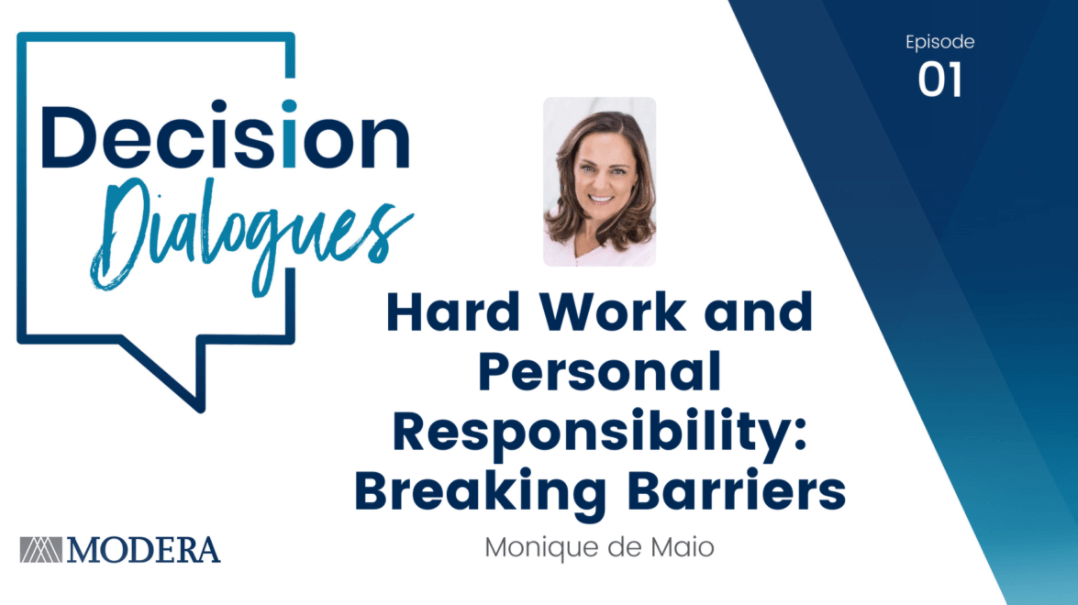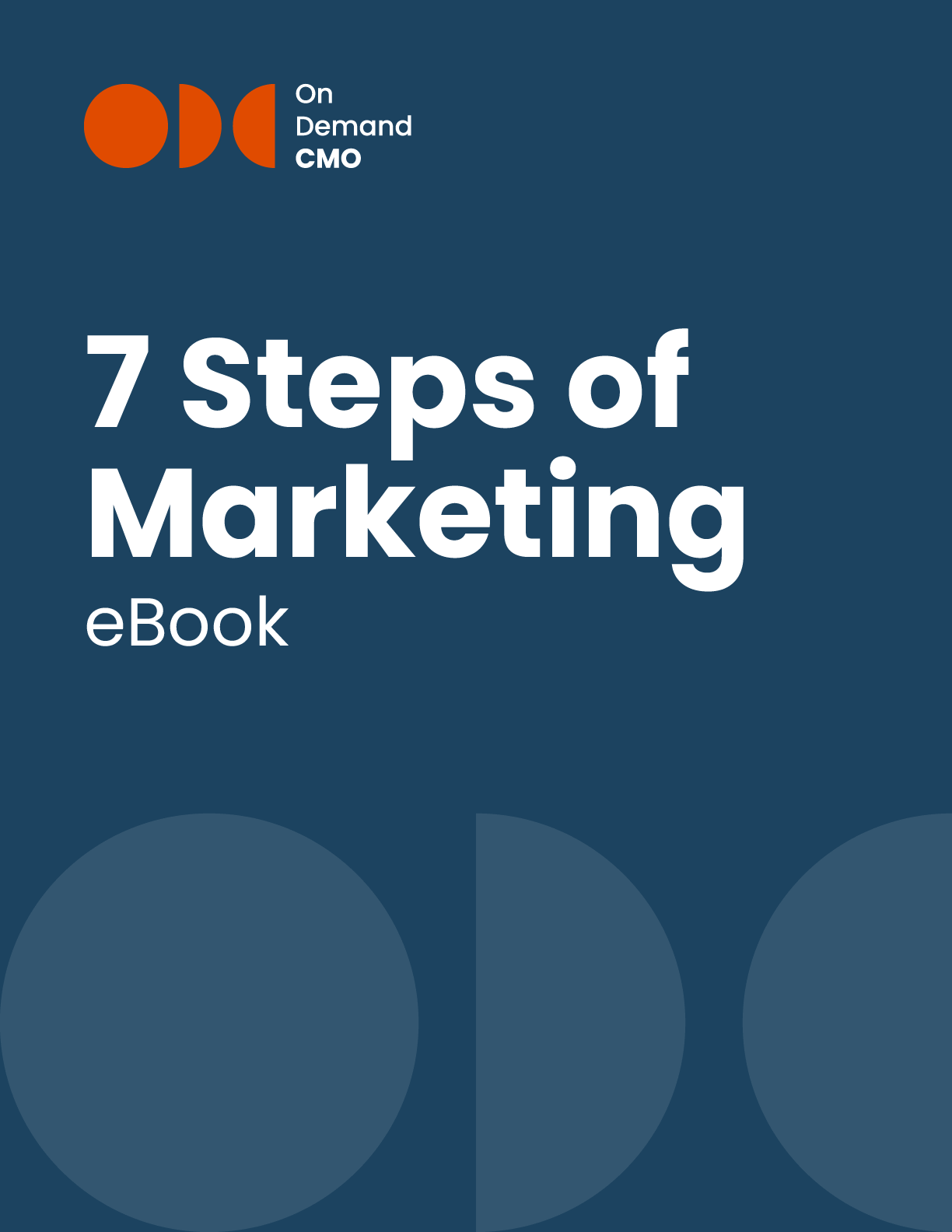
Mark Willoughby and Jennifer Faherty of Modera recently invited me to speak on their inaugural episode Hard Work and Personal Responsibility of Decision Dialogues, a podcast series featuring stories from successful business owners.
It was a different spin from my typical talks around marketing and branding advice. In this podcast, I get pretty personal. I talk about my varied experiences, starting with my family’s “immigrant-itis” and its effect on the decisions I made as I was starting to mold my career path from a young age. The fact that I was working full-time and commuting as I completed my undergraduate degree in three years, and took night classes while holding down a full-time job in NYC while I earned an MBA, also in about 3+ years.
I then discuss my experience in corporate America, working in marketing and publishing, and the inflection point that led to the decision to start ondemandCMO. These experiences and decisions, combined with a great deal of hard work, had me take responsibility and “succeed or fail on my own merits” pretty early in life. What a journey it has been, but I would do very little differently, because the bumps and bruises made me stronger and more determined to succeed. I am ever so grateful to those who gave me these opportunities to succeed or fail, then–and now. I love what I get to do, every day, for companies of all sizes, on projects of all types, solving both marketing and business problems. Thank you!
Here is link to the conversation and below is the write-up, pick your preference!:
Hard Work and Personal Responsibility: Breaking Barriers
Thanks for joining us on Decision Dialogues—we’re thrilled to have you along. My name is Mark Willoughby, and I’m a Principal Wealth Manager and the Chief Operating Officer of Modera Wealth Management, LLC. Today, my colleague Jennifer Faherty, a chief client experience officer at Modera, and I will be chatting with Monique de Maio, Founder and Chief Marketing Officer of ondemand CMO, a full-service marketing firm. Welcome everyone to the show, and I’ll hand it over to Jennifer to get started.
As Mark mentioned, you have this business, ondemand CMO, but I wondered if marketing was always the field you’ve been involved with? How did that whole that career start in the first place?
So to “back up the truck,” as they say, no, marketing wasn’t always in my line of sight. Undergrad, I went to Pace University in Westchester. I did that quickly; I was busy working simultaneously as going to college, and I was an international management major. I speak fluent French and Spanish, and I always thought that I would go into an international—more organizational—line of work in management.
It happened as a result of my going to work for IBM, while I was in college and getting this exposure to the international division within that company, where I was helping with marketing. And then I was like, “Wow, that’s kind of interesting. Let me pursue that.” And then, ended up going to Salomon Brothers, and then after that, going to school at night and getting an MBA from Fordham in marketing that was more intentional.
Okay, got it. So it was kind of a, something you didn’t expect, but you were exposed to marketing and really enjoyed it over your experience. So from there, you were marketing in a corporation, or?
Yes. So at Salomon Brothers, our Wall Street firm, as you know them to be or had been, we worked in the Event Marketing and Conference Planning department where I met my husband, Steve—who, shh! Don’t tell anybody we were dating.
I met my husband at work, too, so shh!
There you go! The long and the short of it was, we were there, but it was very event-centric. I knew that if I needed to be a more general person, and I wasn’t going to be called the conference planning girl, which was often the term that they used to describe young women who did marketing, I needed to do a pivot.
I went to work as the Director of Marketing and Programs for the Promotion Marketing Association, which was a not for profit, where people from Salomon Brothers thought I was completely out of my mind for doing. It allowed me to work a pretty normal schedule and allowed me to go to school at night. So I completed my MBA in three and a half years.
Oh, wow. Okay, yeah, juggling a lot there. And you mentioned that they were kind of thought you were crazy for doing that. Why was that?
Well, you know, here you are on Wall Street, and you’re making a pretty good living, and you have these fabulous perks at the time—it was the 80s, right? “Budget” wasn’t a word, and we were traveling everywhere. I was going to Europe. I was going all across the country planning events, meeting fantastic people, and had a pretty great lifestyle. To go to a not-for-profit making sort of just about the same money as my base salary was like, “What are you doing, you crazy girl, you’re leaving a Wall Street firm, and you’re going to a not-for-profit? Are you dumb?”
So that’s like a great first decision you’re coming to. So what can you talk to us about what went into that decision?
Yeah, sure. The real decision was that I got to be the director of marketing and director of programs. So I leveraged my ability to put on events. Still, I was also leveraging a new skill that I wanted to grow, which was the ability to make marketing decisions for an organization, which I knew I would never be able to do if I stayed at Salomon Brothers. I would forever be known as “the conference girl.”
No, so—that’s an interesting question. Firstly, I thought for a while at that point, I’m not freshly minted anymore, but I have an MBA. I have these sales skills, and I know I can sell, and I’m getting offers from other publications to be either a marketing director or a publisher. This is interesting because you can be on both sides of the house. And I’m like, “Well, if I get more of the same, I’m going to have my nanny raise my child,” and this is going to be a little problematic because that’s not really why I waited seven and a half years to have a baby. “I think I should really do this myself.”
So I talked to my husband, and I said, “Listen, you know, we live below our means. That’s generally the way we approach most things.” I said, “We’ll try it. We’ll give ourselves a year or two, and if it doesn’t work, I can always go back to corporate. I could always go back to publishing or whatever.” And the honest thing is that I left my job was to retain clients who wanted to work with me before I even left. So the business was started before it was starting.
So as a mother, though, having your own business couldn’t have been easy?
No, it wasn’t. Nothing worth having is really that easy.
Congratulations!
Thank you. You know, it’s funny, we were talking about, you know, “Are you serious about this business?” and in the old days, when I was walking my son up to school, people would be like, “Are you still doing that part-time, like, design stuff?” Yeah, no, not exactly.
The way we work is that we really become companies’ sort of extension of their marketing departments. So what they’ll have a certain skill set internally, and then we supplement wherever they need. If they have people executing many things, we’ll come in and do more planning, more strategy. And then, if they have the strategic plan and have a vision of where they want to get to, we’ll help them execute it. We either can be on a routine basis, where we’re that outside resource, or we can come in to do a project or a problem.
In the beginning, it was like, “Well, I have a client here, and I have a client here because they know me, and we started whatever,” and you were afraid to pick a swim lane. That’s the one thing I would say is—I say to entrepreneurs, who are starting in any business:
“Be prescriptive about whom you want to serve, and what you want to do for these prescriptive persona people. However, you want to talk about that stuff, your target customer is your target customer for a reason. What is that? Why is that?”
Then spend some real quality time analyzing whom you could best serve and why, and make that super clear. Because if you’re trying to be all things to all people, which we all do when we start our business, we spend tons of calories chasing the wrong client. And then we regret it because we can’t service them. After all, the skill sets really don’t align or do the chemistry.
It is so interesting, though, to look back now as one’s career and see all the different pivot points and, kind of, what you take from those experiences and bring in now. And it sounds like you don’t seem to regret that much because you can see how it plays in.
Yeah.
But it’s always a fun question—Is there anything you regret?
The only regret I would say is what I spoke about before, which is not picking my swim lanes faster, and being much more—so my staff would always be like, “Listen, you need to be on the website” as an example, right? And I was like, “I don’t need to be on the web, blah, blah, blah,” and you take yourself out of the equation thinking that you’re doing yourself a service.
You’re not—because in actuality, who you are dictates who will work well with you and who will be attracted to working with you, because ultimately, when you sell a service, you’re buying the person.
I don’t have a widget. I don’t even have a marketing automation thing. I’m like, “I’m not selling you anything, right? I’m selling you what’s here. So if you don’t like me, as I show up, and how I speak and how I can approach your business, you’re not gonna hire us. It starts with me,” right?
*Click here to listen to the conversation in its entirety.

OnDemandCMO has authored 7 Steps of Marketing, the only marketing guide book you’ll need to either get your marketing started properly, or stay on track strategically.
It features best practices on branding, messaging, social media, lead generation and much in between.
Please let us know who you are, and we'll share a few of our secrets (we don't sell or trade your info)!